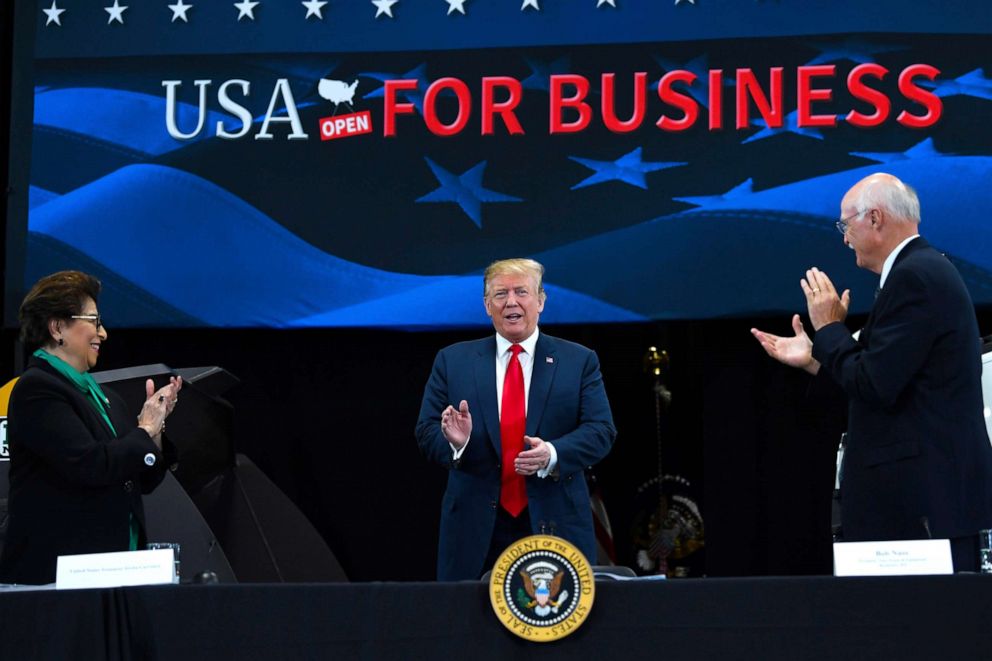Study finds tax cut has not been the 'rocket fuel' for economy as Trump claims
Ordinary workers saw a particularly small growth in wages last year.
The 2017 tax cut that President Donald Trump claims has been "rocket fuel" for the economy has had a small, if any, effect in its first year, according to a newly released congressional report.
According to the report released on Tuesday by the nonpartisan Congressional Research Service, the nation's gross domestic product grew at relatively small rate of 2.9 percent in 2018, while real wages grew even more slowly, at only a 2 percent rate, undermining President Trump's repeated claims the GOP tax cuts boosted wages.
"[O]rdinary workers" in particular experienced "very little" wage growth last year -- only a 1.2 percent increase in wage rates for "production and nonsupervisory employees."
"On the whole, the growth effects tend to show a relatively small (if any) first-year effect on the economy," the report stated.

The report's finding that the tax cuts have had modest effects on the economy is consistent with predictions by outside analysts from when the tax cuts were first implemented, according to Howard Gleckman, a senior fellow at the liberal-leaning Urban Institute, though it's hard to determine exactly how much effect the tax cuts have had on the economy because President Trump's various other economic policies such as tariffs could have offset effects from the tax cuts.
"It's hard to tease all that out, but the overall story is that wages grew more slowly than the economy grows, also trend that has been going on for a long time," Gleckman said.
Gleckman also pointed out that, according to the report, investments grew "significantly" but not from sectors that benefited the most from the tax cuts, indicating that the growth in investments might not have come from the cuts.
Instead, the report found that much of the proceeds from the tax cuts were used by companies to buy stocks worth of $1 trillion by the end of 2018.
Only a minuscule percentage of the corporate tax cut -- a total of $4.4 billion -- went to employee bonuses and wage increases, a trend, according to the report, that is "consistent with what most economists would expect" that a small percentage of increased corporate profits would be used to compensate workers.
Saying “relatively little” went to the worker bonuses that Trump promised, the report states “With US employment of 157 million, this amount is $28 per worker. This amount is 2% to 3% of the corporate tax cut...."
Chris Edwards, director of tax policy at the libertarian Cato Institute, said it's natural that the benefits of corporate tax cuts are not easily visible yet in its first year. Edwards said benefits for corporate tax cuts are long term down the road, as tax cuts spur investments from companies, which eventually leads to increased productivity and wages.
"I think it’s a case that the theory is more powerful than the messy results we’re seeing," Edwards said. But Edwards acknowledged that the tax cuts are also likely to add deficits to the government, which is a "giant problem" to the U.S. economy.
The Trump administration's top economic advisers, including Treasury Secretary Steven Mnuchin and National Economic Council Director Larry Kudlow, have repeatedly claimed that that the tax cuts will pay for themselves, but the new report found that the tax cuts were responsible for only 5 percent or less of the growth needed to fully offset the revenue loss from the cuts.
Earlier this year, the Treasury Department announced that the federal government is set to borrow $1 million two years in a row to finance deficit following tax cuts and government spending increases implemented under the current administration.




